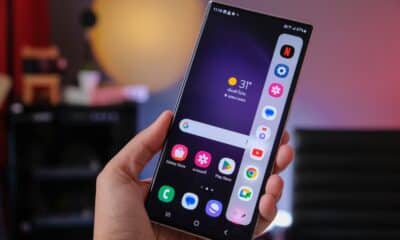Phones
Samsung And Google Improves Cross-Platform Messaging Collaboration
The advent of cross-platform messaging is revolutionizing communication by enabling seamless interactions across various devices and operating systems. Previously, messaging often faced limitations due to platform-specific protocols, which resulted in fragmented experiences and hindered effective exchanges. However, the emergence of Rich Communication Services (RCS) has introduced a modern, interoperable messaging standard that expands possibilities for users. RCS enhances messaging through features like high-quality media sharing, text reactions, and improved group chats, all accessible regardless of the user’s device or operating system.
This shift in messaging technology is heavily influenced by industry giants such as Samsung and Google. These companies recognize the critical role of cross-platform communication and have dedicated considerable resources to develop and promote RCS. Through collaboration and advocacy for this standard, Samsung and Google aim to create a future where individuals can communicate effortlessly without the constraints of different platforms.
The implications of cross-platform messaging stretch beyond personal use. It has the potential to enhance business communications, aid in international collaboration, and foster connections among people, irrespective of their preferred technology. As more devices and carriers adopt RCS, its advantages will become increasingly clear, paving the way for a more connected and efficient world.
A major benefit of RCS is its accessibility at no extra charge. Samsung and Google have worked diligently to ensure that this technology is available to a broad audience, including users on the most recent iOS versions. By widening the reach of cross-platform messaging, these companies are making communication more democratic and empowering users to engage on their own terms.
As RCS gains traction across more devices, users can anticipate these advanced features being integrated seamlessly into their existing messaging applications. This integration means users will not have to download additional applications or pay for separate services to experience the advantages of cross-platform messaging. The widespread availability of RCS is expected to accelerate adoption, creating a more cohesive and effective messaging environment.
Specifications
High-Quality Media Sharing: RCS allows for the transfer of high-resolution images and videos between Android and iOS devices, ensuring that media retains its original quality. This feature significantly improves the sharing experience, enhancing the vibrancy of conversations.
Text Reactions: Users can express themselves through emoji or other forms of reactions thanks to RCS, adding interactivity to chats. This functionality encourages more dynamic and expressive communication, enabling people to convey emotions and replies more effectively.
Enhanced Group Chats: RCS refines group messaging by allowing users to easily manage participants, irrespective of their operating systems. This feature facilitates smoother group discussions and ensures everyone can participate, enhancing teamwork and coordination.
Summary
As cross-platform messaging evolves, numerous exciting developments lie ahead. For those intrigued by the broader impacts of this technology, several areas are ripe for exploration.
One potential advancement is the inclusion of end-to-end encryption within RCS, offering users higher levels of security and privacy in their conversations. With data protection gaining importance, the integration of stringent encryption methods could enhance the attractiveness of cross-platform messaging.
Another area worth noting is the possibility of AI-driven enhancements to messaging. As artificial intelligence progresses, it could be utilized to refine the messaging experience by providing smart suggestions, automated responses, and tailored recommendations. The combination of AI and RCS could foster a more efficient and intuitive communication process, saving users both time and effort.
Moreover, the seamless fusion of RCS with other communication platforms, such as video conferencing and file-sharing services, could create a more streamlined user experience. By erasing the barriers between various communication modes, users would be able to transition effortlessly between messaging, calls, and video chats, thereby boosting productivity and enhancing teamwork.
As technology continues its rapid advancement, users can anticipate even more innovative communication options globally. The RCS movement, spearheaded by Samsung and Google, signifies the dawn of a new era in messaging—one that promises to bring people closer and redefine our interactions in the digital landscape.















